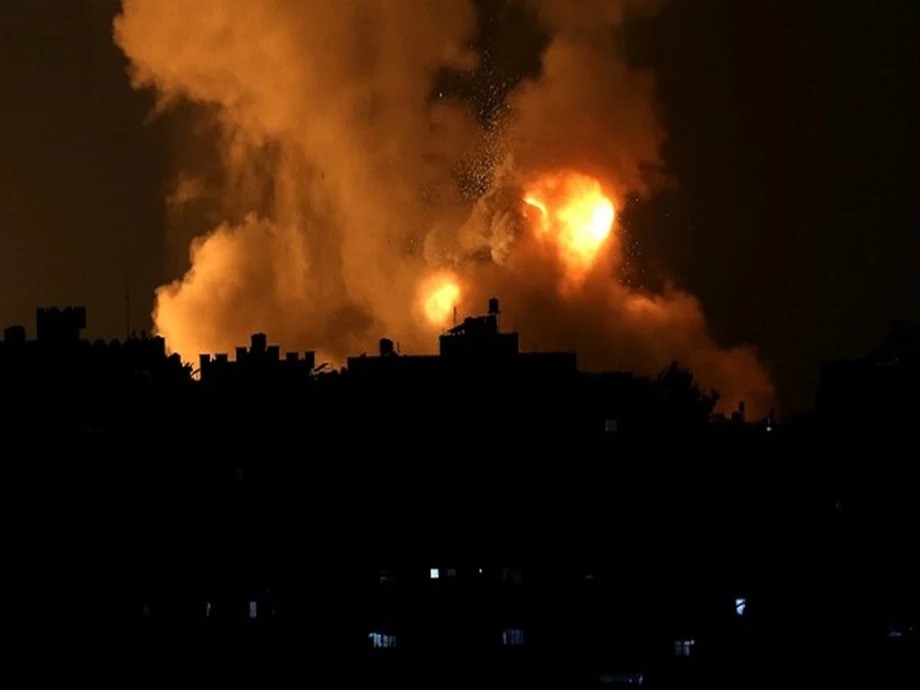DOHA/TEL AVIV: Israeli forces bombed areas in the southern border town of Rafah, home to more than half of Gaza’s population, on Thursday, a day after Prime Minister Benjamin Netanyahu rejected a proposal to end the war in the Palestinian enclave.
Netanyahu said on Wednesday that the terms proposed by Hamas for a cease-fire, which would include the release of hostages held by the Palestinian militant group, were “delusional” and vowed to fight on, saying victory was within reach and months away.
The rejection followed intense diplomacy to end the four-and-a-half-month conflict ahead of a looming Israeli assault on Rafah, which is now home to more than a million people, many in makeshift tents and lacking food and medicine.
In a sign that diplomacy is not over, a Hamas delegation led by senior official Khalil Al-Hayya arrived in Cairo on Thursday for ceasefire talks with mediators Egypt and Qatar.
Aid agencies have warned of a humanitarian disaster if Israel follows through on its threat to enter Rafah, one of the last remaining areas of the Gaza Strip where its troops have not moved during the ground offensive.
Israel says it is taking steps to avoid civilian casualties and accuses Hamas militants of hiding among civilians, including in school shelters and hospitals, leading to more civilian deaths. Hamas denied this.
Israeli planes bombed areas in Rafah on Thursday morning, residents said, killing at least 11 people in airstrikes on two houses. Tanks also shelled some areas in eastern Rafah, heightening residents’ fears of an imminent ground attack.
Inside Rafah, mourners wept over the bodies of those killed in an airstrike that hit the Tel Al-Sultan neighborhood. The corpses were laid in white shrouds. A man carried the body of a small child in a black bag.
“Suddenly, in the blink of an eye, rockets hit children, women and old men.” for what? Why? Because of the upcoming ceasefire? This usually happens before any ceasefire,” resident Mohammed Abu Habib said.
Emad, 55, a father of six who took refuge in Rafah after fleeing his home elsewhere, said the biggest fear was a ground attack, with nowhere to run: “We have our backs to the (border) fence and our faces to the Mediterranean Sea . Where should we go?”
Diplomatic pressure
Despite Israel’s rejection of Hamas’ proposal, further talks are planned. US Secretary of State Antony Blinken, on his fifth trip to the region since the start of the war this week to broker a deal, said he still saw room for negotiation.
At a late-night press conference Wednesday, Blinken said elements of the proposal put forward by Hamas contained clear “non-starters,” without saying what they were, but that he would continue negotiations.
Blinken also said the civilian death toll was too high and reiterated that Israel’s operation should put civilians first.
“And this is especially true in the case of Rafah, where 1.2 to 1.4 million people live, many of whom have been displaced from other parts of Gaza.”
He said he suggested some ways to minimize the damage in talks with Israeli leaders, but gave no details. Blinken returned to the US on Thursday afternoon.
A Hamas delegation in Egypt is expected to meet with officials including Egyptian intelligence chief Abbas Kamel, Egyptian security sources said.
Speaking in Nicosia, Egyptian Foreign Minister Sameh Shoukry said Egypt was working with all parties involved to find an end to the conflict and called on the international community to exert more pressure to get aid to Gaza.
Jordan’s King Abdullah also embarked on a diplomatic mission to Western capitals to meet with US President Joe Biden on Monday.
Hamas, which rules Gaza, has proposed a four-and-a-half-month truce in which all hostages held in Gaza would be freed, Israel would withdraw its troops and an agreement would be reached to end the war.
The Hamas offer was a response to a proposal drawn up by US and Israeli spy chiefs and delivered to Hamas last week by Qatar and Egypt.
Hamas says it will not agree to any deal that does not include an end to the war and an Israeli withdrawal. Israel says it will not withdraw or stop fighting until Hamas is eradicated.
Rising death toll
Israel launched its military offensive after Hamas militants from Gaza killed 1,200 people and took 253 hostages in southern Israel on October 7, according to Israeli records.
Israel’s military said Thursday that its troops had killed more than 20 militants in the southern Gaza capital of Khan Younis in the past day, now the scene of some of the heaviest fighting of the war. It has made similar claims since the start of the operation to attack the city last month, which cannot be independently confirmed.
It said it had detained dozens of suspected militants, including two suspected of involvement in the October 7 attack. 71 previously arrested were released.
Gaza’s health ministry says at least 27,840 Palestinians have been confirmed killed and more than 67,000 injured.
Israeli bombardment continued overnight in Khan Younis and Deir-Al-Balah in central Gaza, killing Palestinian television journalist Nafez Abdel-Jawwad and his son.
Philippe Lazzarini, head of the UN’s main aid agency for Palestinians, UNRWA, told X that the agency had been denied access to bring food to areas where it had “identified deep places of hunger and starvation,” with people on the brink of famine.
UN human rights chief Volker Turk has said the Israeli military is bulldozing civilian infrastructure to create a buffer zone inside the Gaza border fence, which he says may be a war crime. A senior Israeli military official denied this: “Our operations along the border are aimed at uncovering tunnels. This is not related to the buffer zone at the moment.”







